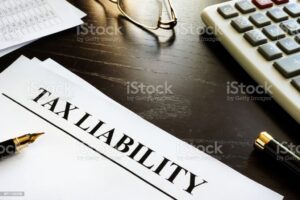WHAT IS TAX LIABILITY?

Tax Liability
Tax liabilities are current liabilities which are treated as short-termdebts that must be paid within a year. Generally, you incur shorterm liabilities from normal business operations. Failing to pay a Tax debt can result in back taxes, a tax lien, penalties, interest,
and even jail time. If you cannot pay taxes due to money
constraints, you might be able to work out a payment arrangement.
Tax debt is the amount of money that organisation or individual
owe to tax authorities, such as your Local, State or Federal
Governments. When, you have a legally
binding debt to your creditor (Government). Both individuals and
businesses can have tax liabilities.
Your business can incur tax liabilities from many taxable events. A
taxable event is a transaction that results in tax liability, such as earning
taxable income, making sales, and issuing payroll.
The government decides which events are taxable. When a taxable event
occurs at your business, you must pay the appropriate tax authority
You may have additional tax liabilities other than the ones listed here,
such as franchise or excise tax. But, here are some of the most common tax
liabilities many small business owners come across:
Earned Income Tax Liability
Working individuals are generally required to pay federal income tax and
possibly state and local income taxes, on their earnings.
Employers withhold income tax liabilities from employee wages. But
when you are a small business owner, you will not receive wages (unless
you’re incorporated). And when you do not receive wages, you do not
have income taxes withheld from your earnings.
Your earned income tax liability also may include tax from your
business’s income, unless you are incorporated. You can also pay your
earned income tax liability by making estimated tax payments throughout
the year.
Business Tax Liability
Your business is required to pay taxes on its profits. However, if you
structure your business as a sole proprietorship, partnership, corporation,
you enjoy pass-through taxation. Pass-through taxation means the
business taxes pass through your business and onto you, which is why you
include the business income tax liability as income on your personal
income tax return.
If you structure your business like a corporation, your company becomes
a separate legal entity. As a separate legal entity, your corporation owes
taxes on business profits. Company Income Tax is in addition to the tax
you pay on your earnings as an individual.
Your Corporation must pay a Federal corporate income tax rate ranging
between 20%-30%, depending on the Turnover of your organisation
within a year. In addition to this, your corporation might also pay a Sta



